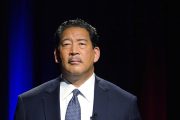
A bipartisan group of eight senators announced on January 28 that they had developed a plan for comprehensive immigration reform. The four Democrats and four Republicans had worked independently of their colleagues in the Senate and informed President Obama over the weekend that they had reached an agreement.
Senator Chuck Schumer (D-N.Y.), one of the eight, said in a Monday press conference,
We have come together on a set of bipartisan principles for comprehensive immigration reforms that we hope can pass the Senate in an overwhelming and bipartisan fashion. We still have a long way to go, [but] this bipartisan blueprint is a major breakthrough.
Schumer’s use of the term “blueprint” reflected the unfinished status of the plan, which has yet to be converted into proposed legislation, which the New York Democrat said the group hopes to have drafted by March.
The other senators who worked on the plan included Michael Bennet (D-Colo.), Dick Durbin (D- Ill.), Jeff Flake (R-Ariz.), Lindsey Graham (R-S.C.), John McCain (R-Ariz.), Robert Menendez (D-N.J.), and Marco Rubio (R-Fla.).
Rubio, the Tea Party senator whose inclusion among the group is seen by many as an attempt to assuage conservative fears that immigration “reform” may be another attempt to provide amnesty to illegal aliens, wrote an article published in Sunday’s Las Vegas Review-Journal in advance of the announcement, “Ex-Las Vegan Rubio outlines a GOP vision for immigration reform.” Rubio said three key areas related to immigration must be addressed:
• “First, we need a modern legal immigration system with an application and compliance system that relies on new technology to simplify the process of coming and staying here legally.”
• “A second key area is improving our law enforcement. Every nation has a right to protect its sovereignty by enforcing its immigration laws.”
• “The third key area: addressing the undocumented immigrants already here. Those who have committed serious crimes in the United States should be found, arrested and deported.”
While most conservatives would not take issue with the principles Rubio stated, his expanded comments on the third point might raise some concerns among those who fear that the bipartisan plan will include amnesty. Rubio continues:
We can’t round up millions of people and deport them. But we also can’t fix our broken immigration system if we provide incentives for people to come here illegally — precisely the signal a blanket amnesty would send.
Instead, the first step should be to require those who have not committed any felonies and are assimilated into America, to have the opportunity to apply for temporary non-immigrant status. To receive this status, they will have to come forward, admit wrongdoing, undergo a background check and pay back taxes and a meaningful fine for violating our laws.
Rubio’s distinction between “blanket amnesty” and “apply[ing] for temporary non-immigrant status” may be lost on those who maintain that legalizing the status of those who are here illegally is counterproductive.
In an appearance Sunday on ABC’s This Week program, Sen. McCain alluded to a factor that many news commentators have made: that the Republican loss of the presidential election last November — in which President Obama carried 71 percent of Latino voters to challenger Mitt Romney’s 27 percent — has caused the GOP to take a new look at immigration reform as a key to increasing its popularity with Hispanic voters.
“What’s changed, honestly, is that there is a new, I think, appreciation on both sides of the aisle — including maybe more importantly on the Republican side of the aisle — that we have to enact a comprehensive immigration reform bill,” said McCain. “I think the time is right.”
If the Republican senators view immigration reform as a way to garner a greater share of Hispanic voters in future election, however, their efforts may prove to be fruitless. In a January 29 article posted by the Guardian, “Five reasons Republicans won’t win over Latino voters,” writer Harry Enten noted:
According to a Fox Latino poll before the election, only 6% of Latinos said that immigration was the most important issue to their vote. A Latino Decisions (LD) election eve poll allowed multiple answers to issues that were important and, still, 65% did not say immigration was important to them.
Latinos instead cared about the economy. About 50% said the economy was the most important issue to their vote. By a 75% to 19% margin, Latinos are more likely to believe in a bigger government, with more services, to a smaller one. President Obama got 75% of the Latino vote in the LD election eve poll — a perfect match.
McCain became one of the most visible spokesmen of the group of eight on Tuesday as he defended the plan during interviews on CBS and MSNBC. Like Rubio, he seemed to mollify conservative objections to amnesty by balancing it with tough talk about “border enforcement.” Reported USA Today:
“Border enforcement and border security is a pre-requisite,” McCain said on CBS This Morning….
McCain said a pathway to citizenship will be established for people already in the USA who have not committed crimes, pay fines and back taxes, and get in line behind those who have already applied legally for a green card.
“They will have to meet a lot of criteria,” McCain said on CBS. “I hope that as more Americans see this proposal that they will understand that we cannot have forever 11 million people living in the shadows in this country,” he said.
“Pathway to citizenship” has become the new amnesty. USA Today produced a graphic summarizing the four key points of the bipartisan plan that included “Immigration Overhaul,” “Employment Verification,” and “Worker Programs.” Number one, however, was “Path to Citizenship.”
As the group of eight senators took to the airwaves to promote their plan (Rubio appears today on Rush Limbaugh’s show), President Obama traveled to Las Vegas to unveil his own vision for immigration reform. VOA News and Yahoo News reported that during a visit to Nevada, where he will speak at Del Sol High School in Las Vegas, Obama will talk about “engaging” the American people on the discussion of immigration reform.
Another report from NPR suggested that Obama’s plan will be somewhat more “liberal” than that proposed by the senators. Quoting from the Washington Post, NPR’s Mara Liasson reported:
For example, the Senate proposal would let illegal immigrants obtain legal residency quickly. But it would not allow them to seek full citizenship until border security had been improved and a new system was in place for employers to verify the employment status of workers.
Obama will not endorse such a proposal, the administration official said. The president intends to make clear the need for a more straightforward route for undocumented workers and students to obtain citizenship.
A good indication of President Obama’s position on immigration reform can be found by reading the material posted on the White House website. As with its Republican counterparts, the administration’s claimed diligence on “enforcing our immigration laws” and “securing our borders” is highlighted, as if to disarm those who may perceive any weaknesses in present immigration policy. The summary of Obama’s “vision for a 21st century immigration policy includes:
• “Responsibility by the federal government to secure our borders“:
This heading is followed by the claim: “Today, our borders are more secure than at any time in the past several decades.”
• “Accountability for businesses that break the law by undermining American workers and exploiting undocumented workers“:
A reasonable goal, though the objective of giving employers “a reliable way to verify that their employees are here legally,” may raise a red flag among those concerned about intrusive methods such as the e-verify program that may violate the privacy of legal citizens.
• “Strengthening our economic competitiveness by creating a legal immigration system that reflects our values and diverse needs:”
While the stated objective, “The law should stop punishing innocent young people whose parents brought them here illegally and give those young men and women a chance to stay in this country,” sounds humane, it does not address the problem created by the “anchor babies” — children born to illegal immigrants whose grant of citizenship is used to justify the continued presence of their parents on U.S. soil.
• “Responsibility from people who are living in the United States illegally“:
While the listing of the responsibilities assigned to the illegal aliens sounds worthy enough (e.g., “registering and undergoing national security and criminal background checks, paying taxes and a penalty, and learning English”) and the statement “Being a citizen of this country comes not only with rights but also with fundamental responsibilities” is certainly true, the statement ignores the fact that — responsible or not — illegal aliens are neither citizens nor candidates for citizenship unless they leave U.S. soil and apply for legal immigration status before reentering.
The White House statement, “We can create a pathway for legal status that is fair and reflects our values,” mirrors the language employed by the group of eight senators.


